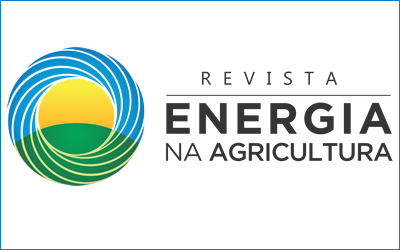AVALIAÇÃO DO CONFORTO TÉRMICO DE AQUECEDORES SOLARES COMPOSTOS POR EMBALAGENS REAPROVEITÁVEIS UTILIZANDO MODELOS DE REGRESSÃO POLINOMIAL
DOI:
https://doi.org/10.17224/EnergAgric.2016v31n3p273-281Resumen
O aproveitamento da energia solar é um tema abordado por diversos pesquisadores, sejam com aproveitamento em conversão elétrica desta energia, sejam eles com a utilização de aquecimento solar. Uma vez que esta última forma de conversão vem apresentando interessantes relações custo/benefício, diversas pesquisas foram realizadas visando provar tal fato, e também aprimorar tais aquecedores para ou terem uma maior eficiência, ou menores custos. No Brasil, um modelo de aquecedor solar compostos por embalagens reaproveitáveis, construído e patenteado (sob domínio público) pelo aposentado José Alcino, da cidade de Tubarão-SC, e vencedor do prêmio Super Ecologia 2004 da revista Super Interessante, vem se destacando-se justamente pelo seu baixo custo e facilidade de construção. O objetivo deste trabalho foi realizar uma avaliação do conforto térmico destes aquecedores frente aos convencionais, utilizando modelos de regressão polinomial a partir de um método de comparação com aquecedor convencional instalado em diferentes locais. Para isto, foram realizadas aferições de temperatura do ambiente e da água aquecida pelo aquecedor alternativo, bem como obtido dados de um aquecedor convencional instalado em local diferente ao do primeiro aquecedor. Utilizando-se de métodos matemáticos para a utilização dos resultados térmicos do aquecedor convencional para o local de instalação do aquecedor alternativo, foi possível a realização da comparação térmica. O sistema de alternativo apresentou médias de temperatura com 10°C abaixo da água do sistema de aquecimento convencional.
PALAVRAS-CHAVE: energia solar, modelos matemáticos, aquecimento de água.
EVALUATION OF THE THERMAL COMFORT OF SOLAR HEATERS COMPOSED BY REAPROVEITABLE PACKS USING POLYNOMIAL REGRESSION MODELS
ABSTRACT: The use of solar energy is an issue addressed by several researchers, whether they use electric conversion of this energy, whether using solar heating. Since this last form of conversion has presented interesting cost-benefit relationships, several researches have been carried out to prove this fact, and also to improve such heaters for or have a higher efficiency or lower costs. In Brazil, a model of solar heater made up of recyclable packaging, built and patented (under public domain) by the retired José Alcino, from Tubarão-SC, and winner of the 2004 Super Ecology Award of Super Interessante magazine, has been a highlight precisely because of its low cost and ease of construction. The objective of this work was to perform an evaluation of the thermal comfort of these heaters compared to conventional heaters using polynomial regression models from a comparison method with conventional heater installed in different locations. For this, measurements were made of ambient temperature and water heated by the alternative heater, as well as data obtained from a conventional heater installed in a different location than the first heater. Using mathematical methods to use the thermal results of the conventional heater for the location of the alternative heater, it was possible to perform the thermal comparison. The alternative system presented averages of temperature with 10 ° C below the water of the conventional heating system.
KEYWORDS: solar energy, mathematical models, water heating.
Descargas
Publicado
Cómo citar
Número
Sección
Licencia
Esta revista proporciona acesso publico a todo seu conteúdo, seguindo o princípio que tornar gratuito o acesso a pesquisas gera um maior intercâmbio global de conhecimento. Tal acesso está associado a um crescimento da leitura e citação do trabalho de um autor. Para maiores informações sobre esta abordagem, visite Public Knowledge Project, projeto que desenvolveu este sistema para melhorar a qualidade acadêmica e pública da pesquisa, distribuindo o OJS assim como outros software de apoio ao sistema de publicação de acesso público a fontes acadêmicas.





